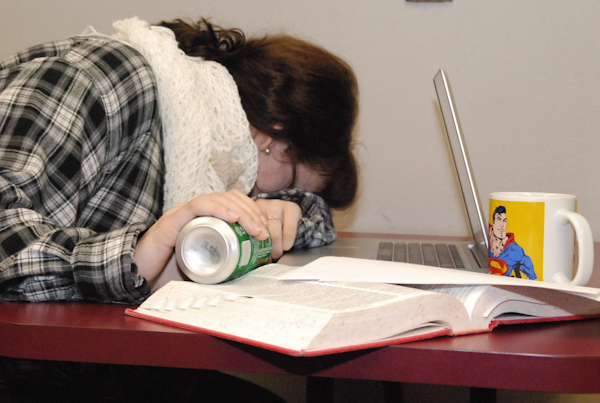Photo by: Henoc Kivuye
Most students experience it at some point in college – an all-nighter. Maybe the cause is writing a thesis paper for the department head, studying for an engineering exam or preparing for a final.
According to senior Mark Concha, all-nighters are inevitable and sometimes there is not another option.
“You can’t really avoid them,” Concha said. “If it needs to be done, it needs to be done.”
But are all-nighters necessary? Several students think they are important. Like Concha, they see the demand for excellence in their education, and sometimes that requires staying up all night to achieve that excellence at the collegiate level.
Senior Kristen Lindsey described her first all-nighter at Oklahoma Christian.
“After one awful decision to pull an all-nighter my sophomore year, I will never do that again,” Lindsey said. “I was taking several challenging classes. I decided the only way I could potentially pull one of my grades up was to pull an all-nighter … however, by the next morning, I was dead tired. I kept drifting in and out during my first final and still didn’t raise my grade and I dropped my grade in another class.”
Lindsey’s experience demonstrates the pros and cons of pulling all-nighters.
According to students who were questioned about their all-nighters, the only pro was the amount of work and cramming that was achieved. Most of the cons students faced were extreme weariness and fatigue, reduced test scores, grogginess and poor health. Students claimed that the symptoms lasted throughout the entire week after the all-nighter.
With midterms and approaching deadlines, all-nighters seem to be necessary to some in order to get the necessary work completed.
It’s unclear if this will produce the best results. Professor of Psychology and Family Studies Tina Winn noted the importance of sleep and the effects it has on a person’s memory.
“Sleep allows our brain to reset, reboot, restore the chemical balances,” Winn said. “It allows our physical body to clean out cells and boost the immune system.
According to Winn, when the mind is awake after a good night’s sleep the results it produces will be better.
In order to pull off an all-nighter, a student will employ certain tasks or ways to keep him or herself from falling asleep.
Senior Lauren Wheeler keeps herself awake using a variety of techniques.
“I drink lots of pop and eat chips or another snack,” Wheeler said. “I will also put a movie on in the background that I’ve seen many times before for noise.”
There are a variety of health scares that can surround pulling an all-nighter. One of the biggest and perhaps the most threatening is the increased chance of having a stroke at an early age. The body needs rest, as does the mind. Depriving it for even one night can have negative consequences.
“There are definitely risks,” senior Suzanne Bigelow said. “The biggest risk I can think of is driving because you’re not fully alert and your reaction times are slower. Not getting enough sleep also greatly impacts your health; you’re more likely to become depressed, gain weight and your immune system doesn’t work as well.”
However, Bigelow pointed out that with all things in moderation, pulling an all-nighter could not be especially devastating to health, but could have other consequences.
“I don’t think one night without sleep is going to be that drastic,” Bigelow said. “If you’re not driving I think your biggest risk is just doing stupid things. There’s a chance you won’t be able to think clearly in class or you might be a jerk just because you’re so tired and irritable.”
From the social aspect of students’ lives to the thriving and demanding life of academics, the effects of pulling all-nighters can be seen on college campuses.
In an attempt to study and excel in college, all-nighters could have an adverse reaction. From causing next day grogginess to increasing the likelihood of a stroke, students are putting their health and grades at risk.















Be First to Comment